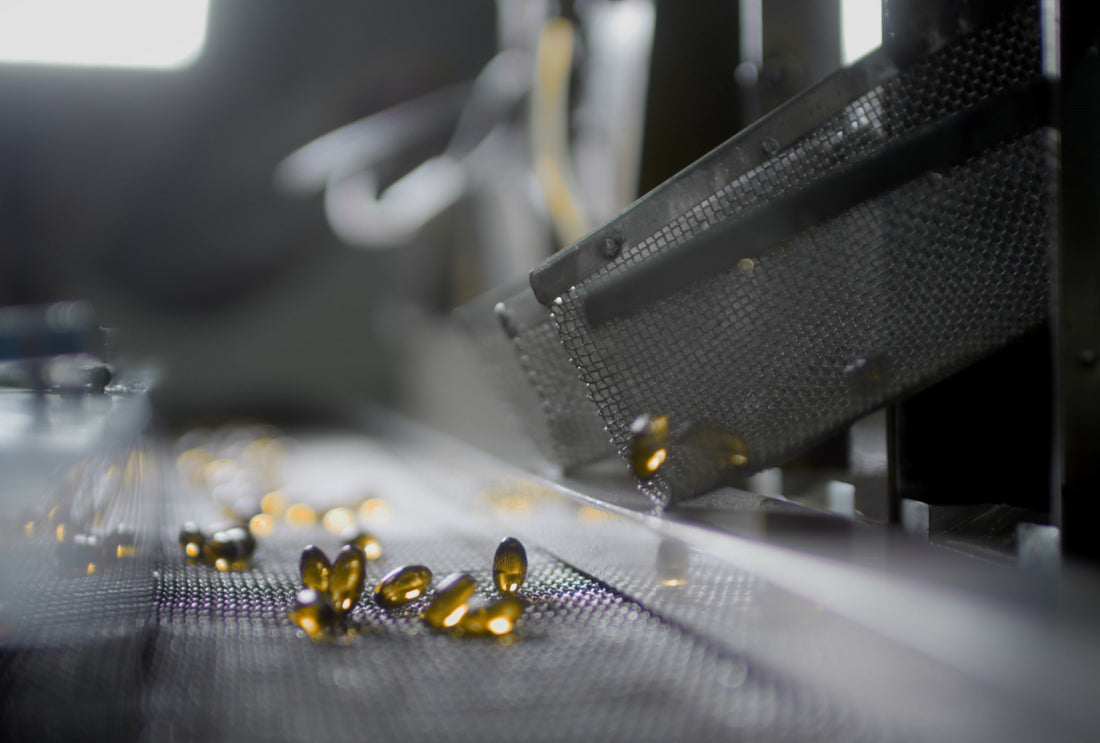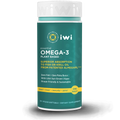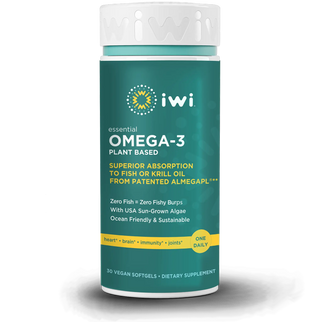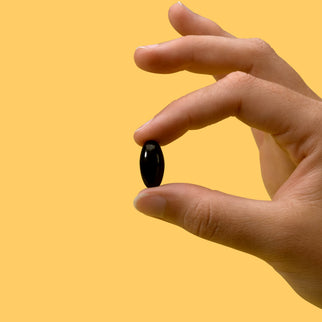Have you fallen into the hype surrounding fish oil yet? Many people have made sure to have a fish oil supplement in their medicine cabinet or kitchen counter.
With the hype surrounding fish oil, how these supplements are made shouldn’t be a secret.
It’s always important to know where the foods and supplements we put in our bodies come from. Understanding how fish oil is made and processed allows us to understand where our nutrients are coming from and consider other alternatives to choosing the supplement in our diet.
What Is Fish Oil?

Fish oil is a popular supplement that offers many potential health benefits. Fish oil supplements often come as capsules or in a bottle of the pure oil itself. Fish oil comes from the tissues of fatty, oily fish. The most common fish used for making fish oil are mackerel, salmon, tuna, and herring.
Fish oil offers multiple potential health benefits due to its large amount of healthy fats. Other types of fish oil, like cod liver oil, may offer additional benefits by providing additional nutrients. Fish oil is sometimes confused for krill oil. However, krill are crustaceans, not fish, so they are not the same product.
Fish undergo an extensive process to create fish oil supplements, starting with the extraction from the tissues of fish down to the point where they are put into a bottle or capsule.
Why Do People Take Fish Oil?
People take fish oil with the hopes of enjoying some of the many potential health benefits. These benefits come from the supplement’s high omega-3 content. Fish oil contains two of the most valuable omega-3s — docosahexaenoic acid (DHA) and eicosapentaenoic acid (EPA).
Thanks to the concentration of these two essential fatty acids, fish oil may provide any of the following potential benefits:
- Supporting a healthy heart
- Promoting joint health
- Supporting healthy cognitive function, like memory and motor skills
- Helping to maintain a healthy blood pressure
- Supporting a positive mood and emotional wellness
Fish oil is special because it is one of the few sources of both DHA and EPA. Many foods like nuts, seeds, and plant oils contain omega-3s, but these fatty acids are in the form of alpha-linolenic acid (ALA). ALA is not as beneficial as DHA and EPA, so it is important to consume these two essential fatty acids from food directly.
The American Heart Association recommends that people eat at least two servings of fatty fish per week in order to consume a healthy amount of EPA and DHA omega-3s. However, fish oil provides a convenient way to obtain these healthy fats without having to cook fish.
Other types of fish oil may provide additional benefits. For example, cod liver oil is high in healthy fats but also provides vitamins A and D.
How Is Fish Oil Made?
Creating fish oil supplements sounds simple enough — all you need is fish and their oil. However, the process can be a bit more complex than that to ensure a quality supplement. Extracting fish oil and creating supplements features three key steps to maintain high quality.
Fishing
Unfortunately, there is no way to produce fish oil without harming fish in the process. Fish oil, of course, starts with taking fatty, oily fish out of the ocean. This process is done on a large scale, often using nets to take as many fish out of the water at one time as possible. This process can harm the surrounding environment, but it is necessary to produce this supplement.
Extraction
Once the fish are caught, the extraction process begins. The extraction process starts by using a method called rendering. Rendering uses heat to begin extracting the oils out of the tissues of the fish. After the tissues have been heated, manufacturers use one of two methods to complete the extraction process. The first method uses force to press the heated tissues and remove the oils.
The other option for producing fish oil is to use solvents, which are substances that help remove the oil from the tissues. However, this process often takes longer to complete.
Purification
After the oil is extracted from the tissues of fatty fish, it is then purified to preserve the shelf life and quality of the product. The purification process involves several smaller stages to remove impurities and keep the most valuable fatty acids.
These stages include degumming, neutralization, bleaching, deodorization, and winterization. These terms are fancy ways to describe removing components from the fish oil to prevent oxidation, bad taste, and toxic pollutants.
Are There Side Effects to Taking Fish Oil?
Taking fish oil is considered safe and comes with few side effects. The potential risks of fish oil are not particularly dangerous and are more often a source of discomfort. Still, it is important to be aware of the risks and know when the problem might be more serious.
Some of the side effects of fish oil include:
- A fishy aftertaste
- Fishy burps and breath
- Heartburn
- Indigestion
- Nausea
The biggest concern surrounding fish oil is for those who may be allergic. Fish oil may cause an allergic reaction for anyone with a seafood allergy. If you notice any swelling, itchiness, or difficulty breathing after consuming fish oil, seek medical attention right away.
As with any supplement, consult a doctor or medical professional before adding fish oil to your daily diet.
What Are the Environmental Concerns with Fish Oil?
Fish oil has become a more popular supplement in recent years. However, the benefits people attribute to fish oil come at a price. This hefty price starts with the number of fish used to create fish oil in the production process. The process of retrieving these fish may be incredibly harmful to the environment.
Fish oil may contribute to the overfishing problem, negatively impacting the world’s oceans and the creatures living within them. As the supplement becomes more popular, companies increase their fishing habits even more to increase fish oil production. This depletes fisheries and takes valuable marine life out of the water, leading to declining fish populations.
Ocean ecosystems are delicate, as they rely on a food chain. When fish populations decline, it affects other species as well. Without smaller fish, larger creatures have no food and begin to die out without them. That said, fishing affects more than just the fish caught.
As another example, fishing damages the wider environment by dragging nets through marine ecosystems and tearing up the ocean floor. In the process, fishers also catch species that they don’t want, which leads to the death of more ocean creatures.
Given the drawbacks of relying on fish oil, many people have begun to embrace alternatives for obtaining the same possible health benefits.
What Are the Alternatives to Fish Oil?
With the potential negatives that come with relying on fish oil, more and more people are switching to other options for getting their DHA and EPA omega-3s.
Other people choose to take krill oil instead, but it still offers the same downsides, as fishing for krill still takes valuable sea creatures out of the ocean and damages ocean ecosystems. Algae is the answer for an option that provides a safe and sustainable alternative.
The number one benefit of algae is that no ocean creatures are harmed in its production process. Algae also uses fewer natural resources to produce, making it better for the environment as a whole. Especially when produced using iwi life’s methods, our algae strain needs very few resources. At iwi life, we rely primarily on sunlight, CO2, and salty water with some added nutrients. Not to mention that our algae pools are way out in the desert, making them far away from the ocean and its precious ecosystems.
Algae provides other benefits for the environment as well. The production of algae alone may help to provide a solution to climate change, as it supports a process called carbon capture. In the process of photosynthesis, algae absorbs carbon dioxide from the atmosphere. Carbon dioxide is a greenhouse gas that contributes to rising global temperatures.
Altogether, the many benefits of consuming algae make it a much better alternative to fish or krill oil, both for our health and for the environment. iwi life gives you the power to embrace algae in your daily diet with our daily omega-3 supplement.
Omega-3s Without the Downsides
The process of extracting and processing fish oil comes at a price. Many people value their nutrition and might not consider the costs behind fish oil production. However, when a harmless alternative is available, we can cut these costs completely.
With iwi life, you can enjoy the health benefits of valuable omega-3 fatty acids without the additional environmental impact. Our algae-based supplements provide both with little environmental impact. Explore our entire family of iwi life omega-3 supplements to see how you can support your health and wellness while also supporting the environment.
Sources:
Fish and Omega-3 Fatty Acids | American Heart Association
Methods of extraction, refining and concentration of fish oil as a source of omega-3 fatty acids | Redalyc
What is Overfishing? Facts, Effects and Overfishing Solutions | World Wildlife Organization


















